The Iron Giant - Decoded (Part 2 of 3)
The Symbol of the 8-pointed Star
An eight-pointed star is equivalent to the six-pointed star but with the addition of a horizontal divider, the horizon line separating heaven and earth. 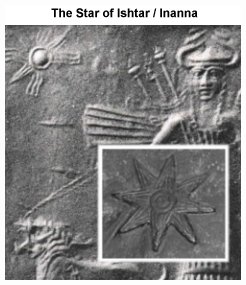 The number eight emphasizes the new creation that will be the union of the heavenly and earthly - the triple helix DNA offspring. I believe it also references Noah the Eighth (as presented in the "Milk Hill 8" crop sign of 8/8/08),
The number eight emphasizes the new creation that will be the union of the heavenly and earthly - the triple helix DNA offspring. I believe it also references Noah the Eighth (as presented in the "Milk Hill 8" crop sign of 8/8/08), 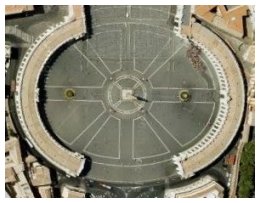 due to the importance of the counter-flood perspective from which this mark-of-the-Beast kind of incursion can be viewed. It's also traditionally known as the star of Inanna, a sign of the goddess. In Norse mythology, she would be most closely identified as Freyja, or Frigg.
due to the importance of the counter-flood perspective from which this mark-of-the-Beast kind of incursion can be viewed. It's also traditionally known as the star of Inanna, a sign of the goddess. In Norse mythology, she would be most closely identified as Freyja, or Frigg.
An inspired example of such a layered star is found at the Vatican, in St. Peter's Square. This one is punctuated by the pyramid-topped obelisk relocated from Heliopolis (On) Egypt under commission of the emperor Caligula. Many of the above observations apply.
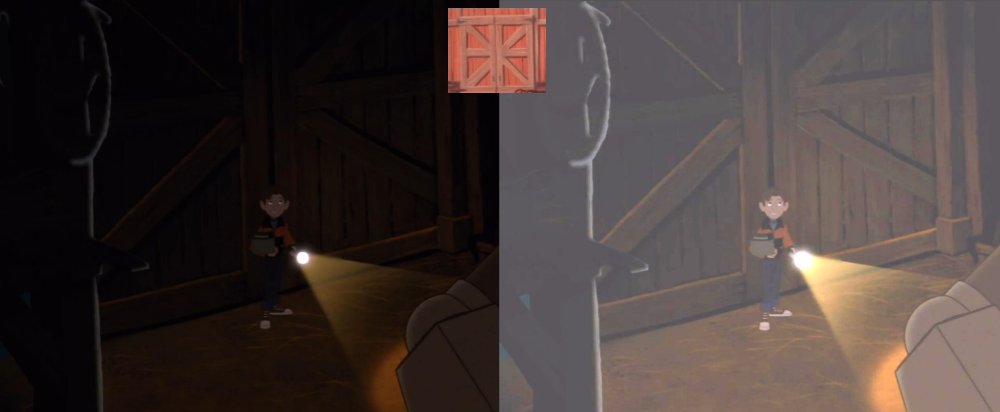
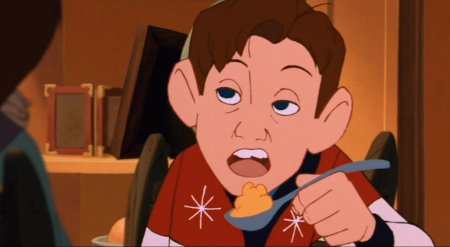 Such a star marks the doors of the barn where the iron giant first stayed in Hogarth's care. A barn is where you might expect a Beast to be kept. The star appropriately marks the barn doors because it represents a dimensional portal. One is presented on the outside of the front door and another on the inside of the back door presumably providing for passage both in and out of the barn.
Such a star marks the doors of the barn where the iron giant first stayed in Hogarth's care. A barn is where you might expect a Beast to be kept. The star appropriately marks the barn doors because it represents a dimensional portal. One is presented on the outside of the front door and another on the inside of the back door presumably providing for passage both in and out of the barn.
The stars on the red and white sweater Hogarth wears are of this eight-pointed variety. Comparing the meaning of the sweater to that of the eight-pointed star reveals how they are companion signals, multiplying their effectual influence.
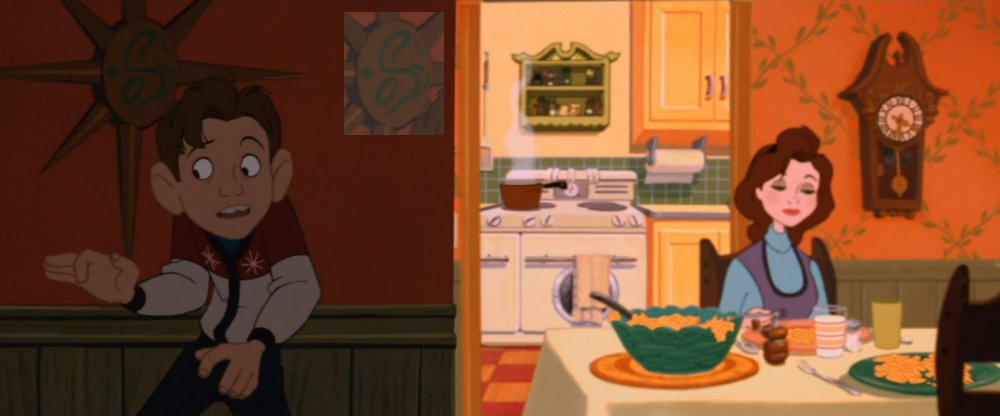
In this next image, we see Hogarth signaling the great secret with both hands. We see the brightly illuminated kitchen with its checkerboard floor, signaling the knowledge of good and evil. The richly symbolic serving bowl sits on the dining room table, resonating with the woven bio-design of the wallpaper. There's an eight-pointed star on the wall with an image resembling a serpent. This decorative object element may represent the brightest star, Sirius, which is assigned such reverence among the esoteric brotherhoods.
The Symbolism of the Union Jack
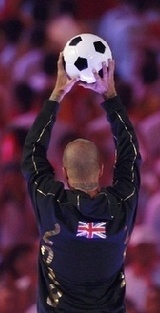
The flag of the UK is another example of the 8-pointed star. Some folks may take offense at the idea of the Union Jack as an occult symbol, yet, it is just that! It signals the great secret just like the flag of Israel, the USA and many, many other nations.
Those who understand the symbolic closing ceremonies of the 2008 Summer Olympics from Beijing should immediately recognize the significance of the flag's appearance on David Beckham's jersey during a climax of the London Presentation. 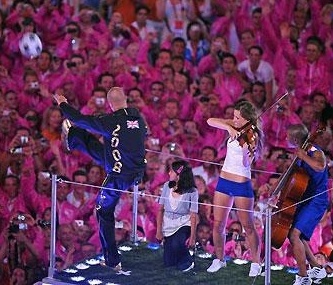 The flag of the UK would not have appeared if it didn't support and magnify the occult signaling of his role in the drama, but it did, and the 8-pointed star was the perfect companion element as this man-star was seen in ritual magic launching the dragon seed from the heavens to earth through the open dimensional portal.
The flag of the UK would not have appeared if it didn't support and magnify the occult signaling of his role in the drama, but it did, and the 8-pointed star was the perfect companion element as this man-star was seen in ritual magic launching the dragon seed from the heavens to earth through the open dimensional portal.
The Union Jack is a composite of three flags, representing the three kingdoms united under this banner. This triplex feature gives added emphasis to the eight-pointed star as a triple helix DNA portal. You may have noted the meaning of the red and white banding, itself a signal of the mixing of the divine sons of god with the seed of Adamic men as iron is mixed with clay. This flag with its powerful occult signaling was exploited in a BIG way during the 2012 London Summer Olympics!
Since the flag of the UK is the subject here, I have to at least mention the flag of Wales, which was apparently left out due to its being considered as a principality of England. Here's an image of the flag of Wales. Its features are easily interpreted and the meaning is clear. The divine sons of god join with the earthly daughters of men and bear the dragon's offspring. If they had included it, well, it's easy to picture the result. More of the same!
The Philosophy of the Undying Soul of All Good Things
There's a subtle but deadly lie presented in the movie. It's delivered in such a way that the viewers are emotionally vulnerable during the hearing of the words spoken. Here's the setup for the scene.
The iron giant is carrying Hogarth around in the woods. They're having fun together and enjoying the natural beauty of rural Maine. They come upon a deer. The deer is not afraid of them. Birds are chirping, it's all very serene. The iron giant slowly extends his hand - the deer approaches - and they touch. It's a tender moment. The deer hears noises and moves away out of sight. Loud gunshots shatter the peace. Shades of Bambi! Hunters have killed the deer - oh my! Hogarth and the iron giant approach to see what happened, scaring off the hunters. Cue the violins. Dialogue ensues.
Hogarth: "It's dead."
Iron Giant: "Dead?"
The iron giant is shook up about it. Hogarth explains about the deer being dead because "they" shot it with the gun.
That evening, in a very saturated "blue" scene, the iron giant is not sleepy but clearly disturbed.
Hogarth: I know you feel bad about the deer. But it's not your fault. Things die. It's part of life. It's bad to kill. It's not bad to die.
Iron Giant: You'll die?
Hogarth: Yeah. Some day.
Iron Giant: I die?
Hogarth: I know. You're made of metal, but you have feelings and you think about things, and that means you have a soul - and souls don't die.
Iron Giant: Soul?
Hogarth: Mom says it's something inside all good things and that it goes on for ever and ever.
The iron giant rolls over and looks up into the starry night.
Iron Giant: Souls don't die.
The music resolves with a beautiful flourish, and the iron giant and all who identify with him are content.
So, in Hogarth's Mom's philosophy, which the iron giant now subscribes to, it doesn't matter what you're made of. If you have feelings and you think about things, you qualify for eternal life, you have an eternal soul, and you can take comfort in that understanding of life and death. So then, if that's true, if you're made of metal like the iron giant, or, if you were, say, made of miry clay with iron mixed in (as in, having accepted the mark of the Beast, worshiping the Beast), you can rest assured knowing that you've got things covered in the "life and death" department. Hogarth's Mom's philosophy is pretty common, isn't it? The problem is - it's a LIE! Many have fallen prey to this deadly lie. It's a setup. This movie is sly.
The Pharmakeia of the Great City Babylon
According to the Bible, drugs spells factor significantly in how the great city Babylon deceives.
and the light of a lamp will not shine in you (the great city Babylon) any longer; and the voice of the bridegroom and bride will not be heard in you any longer; for your merchants were the great men of the earth, because all the nations (ethnos) were deceived by your sorcery (pharmakeia).
Revelation 18:23
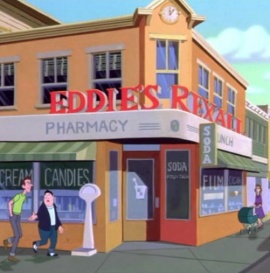 The working of this sorcery (or enchantment) is modeled for us in two notable scenes. In one, the nine-year-old boy, Hogarth, drugs his opponent in a successful bid to elude him so that he can carry out his activity in secret. In the other, he subjects himself to the influence of a drug, and while under the influence he hears a suggestion that he accepts as truth, as being under hypnosis. The suggested philosophical idea, which is true on one level, is the foundation for the lie that becomes the key to the salvation of the lives of men at the climax of the movie. That same lie will induce some to choose to receive the mark of the Beast, thinking wrongly that one can repent of it later. In truth, one cannot!
The working of this sorcery (or enchantment) is modeled for us in two notable scenes. In one, the nine-year-old boy, Hogarth, drugs his opponent in a successful bid to elude him so that he can carry out his activity in secret. In the other, he subjects himself to the influence of a drug, and while under the influence he hears a suggestion that he accepts as truth, as being under hypnosis. The suggested philosophical idea, which is true on one level, is the foundation for the lie that becomes the key to the salvation of the lives of men at the climax of the movie. That same lie will induce some to choose to receive the mark of the Beast, thinking wrongly that one can repent of it later. In truth, one cannot!
The scene where Hogarth drugs his opponent takes place in a Rexall Pharmacy, a classic 50s drugstore with a soda fountain. Hogarth is accompanied by Kent Mansley, a government agent who has attached himself to Hogarth in an effort to discover the whereabouts of the iron giant. Hogarth is hiding the iron giant and he wants to lose Kent so he can go visit the giant at the secret hideout.
In a bid to shake Kent, Hogarth acquires the drug of choice and administers it to the agent on the sly. The drug is coco-lax, a laxative, and the plan is to get away when the effects of the laxative force the agent to use the restroom. The ploy is successful and Hogarth evades the agent to carry out his plan in secret.
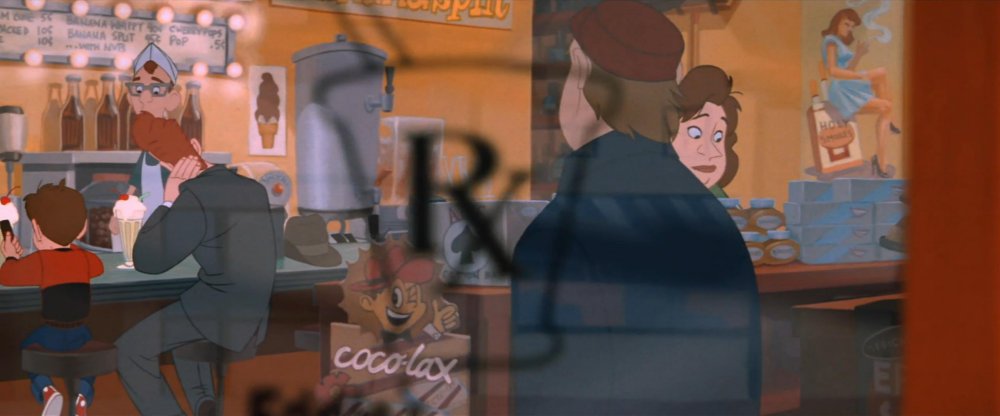
In the image above, there are many symbolic elements. The mortar and pestle with the RX appears on the Rexall's door window, blurred because it's in the foreground and not in the focal range of the pretend camera shooting the scene. The coco-lax display features what looks like a poop-splat behind his head while he's giving us a one-eye sign. 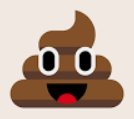 Notice the picture on the wall of a soft serve ice cream cone with chocolate dip. If you compare that to the poo emoji, you'll see why it's behind the agent who is being pranked with the laxative Hogarth sprinkles on his ice cream float. Notice also, the agent's brown hat (poopy butt symbol) sitting on the counter by the huge urn used for dispensing coffee (which is recognized for its laxative qualities).
Notice the picture on the wall of a soft serve ice cream cone with chocolate dip. If you compare that to the poo emoji, you'll see why it's behind the agent who is being pranked with the laxative Hogarth sprinkles on his ice cream float. Notice also, the agent's brown hat (poopy butt symbol) sitting on the counter by the huge urn used for dispensing coffee (which is recognized for its laxative qualities).
Ethically, of course, this is not the kind of example you want your children to follow; practicing deceit, using drugs to manipulate people. In the movie, Hogarth lies frequently, threatens and bullies to get his way, is nearly always disobedient to his mother and disrespects all those in authority. Yet, he is the protagonist and Kent, the antagonist, and so this ploy is justified. But, no, not really. This kind of presentation is how you train up people in lawlessness.
If you have read the adjunct study about pharmaceuticals you probably understand the reason why the Rx symbol is featured in the drugstore imagery. It is a silent inducement, rendered 'recipere' or 'recipe' in Latin and meaning, "take thou." This is fulfilled by the lawless Hogarth as he employs pharmakeia to exert his will.
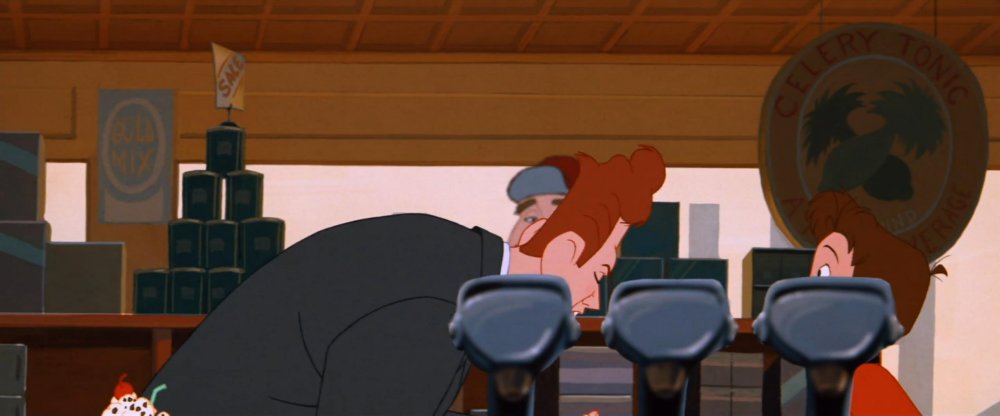

 The Rx symbol also signifies the Beast and the mark of the Beast as the eye of Horus. During the scene in the pharmacy, the "camera" pans past a pyramid that reveals what's really being sold here. Attached to the capstone is a sale sign. We're being sold the Beast, a message I've pointed out over and again, signaled in this antichrist promotional vehicle in a wide variety of ways!
The Rx symbol also signifies the Beast and the mark of the Beast as the eye of Horus. During the scene in the pharmacy, the "camera" pans past a pyramid that reveals what's really being sold here. Attached to the capstone is a sale sign. We're being sold the Beast, a message I've pointed out over and again, signaled in this antichrist promotional vehicle in a wide variety of ways!
In the first pharmakeia scene, there is nothing particularly subtle about the drug ploy. In the next, it's very subtle because, while the drug use is obvious, its role in the implantation of the lie is not.
Under the Influence of Coffee-Zilla Pharmakeia - Hypnotic Suggestion: "You are who you choose to be"
The scene presents nine-year-old Hogarth subjecting himself to the influence of a drug. The drug of choice is caffeine. While under the influence he hears a philosophical maxim and accepts it as truth. This is passed on to the iron giant, and it subsequently becomes the key to the salvation of the lives of men at the climax of the movie. 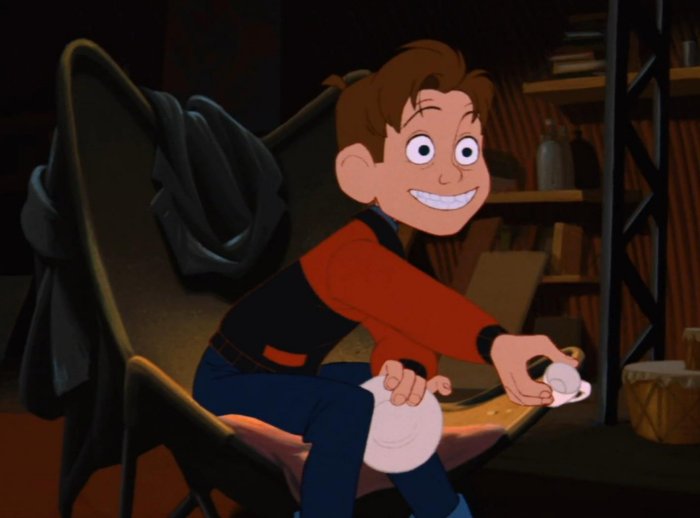 I believe this is a lie that will induce many to accept the mark of the Beast!
I believe this is a lie that will induce many to accept the mark of the Beast!
As the story goes, Hogarth visits the scrap yard where he is trying to hide the iron giant. He has not yet told Dean McCoppen, the proprietor, about the iron giant. While there, Hogarth persuades Dean to make espresso for him, which Dean describes as like coffee-zilla. The effect on Hogarth as he drinks it is played up with humor as the caffeine buzz makes him pace about and talk really fast. When he chatters on about how his peers at school view him, it's in this state of over stimulation that the cool and calm hipster passes on his philosophy. Hogarth stops pacing and sits down across from Dean. "Is there any more coffee?" (See image on left.) Here's Dean's response, delivered while Hogarth gives him his full attention.
"Look, it's really none of my business kid, but, uh, who cares what these creeps think, you know? They don't decide who you are, you do. You are who you choose to be!"
"You are who you choose to be." Really? No. That's a presumptuous and arrogant statement that shows utter disregard for the sovereignty of God!
13 Come now, you who say, "Today or tomorrow we will go to such and such a city, and spend a year there and engage in business and make a profit."14 Yet you do not know what your life will be like tomorrow. You are just a vapor that appears for a little while and then vanishes away.15 Instead, you ought to say, "If the Lord wills, we will live and also do this or that."16 But as it is, you boast in your arrogance; all such boasting is evil.
James 4:13-16
Does that support Dean's philosophy? Does vapor need to be empowered?
31) Then said Jesus to those Jews which believed on him, If ye continue in my word, then are ye my disciples indeed; 32) And ye shall know the truth, and the truth shall make you free. 33) They answered him, We be Abraham's seed, and were never in bondage to any man: how sayest thou, Ye shall be made free? 34) Jesus answered them, Verily, verily, I say unto you, Whosoever committeth sin is the servant of sin. 35) And the servant abideth not in the house for ever: but the Son abideth ever. 36) If the Son therefore shall make you free, ye shall be free indeed.
John 8:31-36
If you simply are who you choose to be, what need is there of being free, of continuing in Y'shua's word? Is there no value in knowing the truth?
Certainly, there are choices some can make in life that don't run afoul through boastful arrogance. There is at times a range of options that are fully within the Lord's will. Could Hogarth be something other than "a shrimpy dork who thinks he's smarter than them," which is the immediate context of the delivery of the aphorism? Perhaps. Extending that further, could he be a doctor or a lawyer? Eventually, possibly. Could he be Miss America? Could he be a Navajo or a Watusi? Well, no. Even where there may be options, there are still limits.
Are the children targeted as the cartoon's audience likely to analyze the statement like I've done? No, they generally just accept it at face value. They won't understand how to assess real limits, and they are encouraged to boast in their arrogance, which is evil. This same maxim, by the way, is taught in our government schools.
Given that the movie is a clever set-up for the mark of the Beast and that the ultimate goal of pharmakeia is to facilitate the serpent's procreative scheme, let's consider the maxim in that context.
If you are who you choose to be, you can accept the mark now and enjoy the perceived benefits. Then, later, if you change your mind you can reject the mark, choosing to be an unmarked person. If you really are who you choose to be, why not? The problem here is that Hogarth couldn't choose to be a Watusi, and no one choosing to accept the mark, after receiving it can repent of it. No one so marked can choose to become an unmarked person. Will some have this philosophy in mind when they are offered the mark and make their big decision? Oh yeah.
And, that all presumes one actually has the option of rejecting the mark, which will NOT be the reality for many. If one continues in life boastfully following what is presumed to be their own "self-directed" plans, they are in truth sinning and, as a servant of sin, are therefore not free. How then will they (you?) decline the mark of the Beast when it's offered?
In the NIV, 1 John 5:19 is rendered, "We know that we are children of God, and that the whole world is under the control of the evil one." This is well put, because the Greek word keimai here means "lies in the power of the evil one, i.e. is held in subjection by the devil."
The freedom most think they have is an illusion. Of this, I am absolutely convinced. To get a better grasp of the really important subject at hand I highly recommend doing a word study on exousia, meaning, "power of choice, liberty of doing as one pleases." If you already have but it was some time ago, you may be surprised at what insight you'll glean as you take another look.
This movie is really an excellent resource for teaching about pharmakeia, and this scene in particular which really lays it out for us. The Revealer of Secrets Y'shua is so generous to open this up for us, exposing the handiwork of the deceiver!